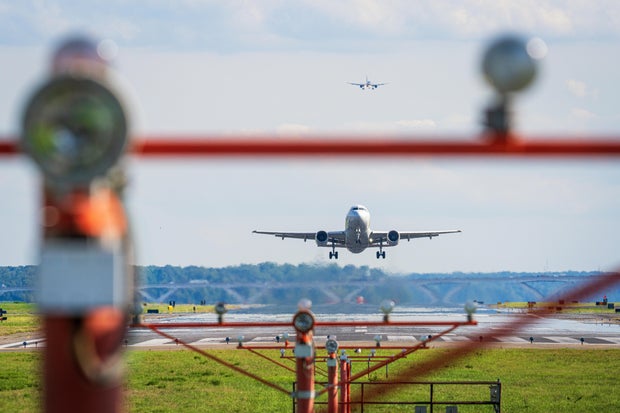The senior officials of the Federal Aviation Administration, including the then administrator Michael Whitaker, pressed last summer to close one of the three tracks in Washington’s Reagan National Airport After two nearby calls among the planes that are still on the ground, several sources told CBS News.
Whitaker, who resigned As FAA administrator, before the transition to the Trump administration, and others in the FAA wanted to close track 4 of the traffic after one incident in April and another approximately six weeks later at the end of May.
On April 18, there was a closed call Between the southwest flight 2937 to Orlando and Jetblue Flight 1554 to Boston. It was told southwest of Boeing 737 to cross track 4 at the same time as the Jetblue Embraer 190 was clear to take off the same track. Air traffic controllers ordered both airplanes to stop, but reached approximately 300 feet from collision.
On May 29, there were Another incident related to At the airport. American Airlines Flight 2134, an Airbus A319 clear to take off to Boston, was forced to hit the brakes because a private King Air plane cleared to land on a connection track.
Air traffic controllers approached the problem, telling him on the American flight to stop their takeoff run (the plane was going to 92 mph at this point, and ordered King Air to turn around, but he had already landed. The American flight was 128 passengers and five crew members on board.
The movement to close the track received a remarkable setback and included an argument that closing it would cause additional loads on track 33: American 5342 flight of the track of the track was supposed to be supposed last Wednesday, when and a Falcon helicopter Army black Chocó in the airkilling 67 people.
According to an impact statement reviewed by CBS News, “track 04 has the additional benefit of not needing to cross the clues to reach. If track 04 is eliminated, the use of track 33 will increase. To reach track 33, the Land must be crossed by both track 01 and track 04 while traffic is kept waiting for and traffic approaches a final of 2 miles to track 01 “.
The FAA told CBS News in a statement: “After the incident of nearby calls on May 29, 2024 at Ronald Reagan Washington (DCA), FAA took measures on May 31, 2024, by temporarily stopping Flights on track 4 in DCA, which is a limited use track used by small regional carriers, while we examine the complexity of multiple intersection tracks. “
Reagan National currently has three clues in use, according to the Washington Airports Metropolitan Authority, which operates the airport. The 1/19 track, the main clue, has 7,169 feet long. The 15/33 track is 5,204 feet long, while the 4/22 track is 5,000 feet long.
Due to its short length, track 4 is used rarely and requires additional coordination with air traffic control. It is restricted to smaller aircraft landings, mainly regional airplanes such as the Bombardier CRJ700 and CRJ900 and the Embraer 170 or E-190 aircraft. It is estimated that only a fifth of the 407 daily departures of the airport is eligible to use track 4. Instead, it is more commonly used as a shooting street to move around the congested airfield.
J. David Ake/Getty Images
The focus on congestion in Reagan National has been ongo capacity last year. FAA pushed back Against a report that asks for additional flights that will be added in Reagan citing congestion problems of existing airport.
Finally, Congress chose to advance with the addition of five additional long distance flights.
“The slabs are controlled by the federal government, the federal mandate, and we have to follow federal regulations,” Terry Liercke, vice president of the airport authority and the Reagan National Airport manager, told journalists.
Airport authority officials refused to directly address congestion concerns after last week’s collision.
“The United States airspace is the safest in the world. Safety is ours on Friday. “… we work with FAA. We are regulated by FAA. We comply with all FAA security regulations.”
Reagan is one of the three capacity controlled airports in the United States. Sometimes it is known as slot control, where each slot is a takeoff or landing. A new route generally requires a couple of slots. Since 2000, Congress has added 64 of these scratch pairs in Reagan, which would admit 32 additional flight routes every day.














